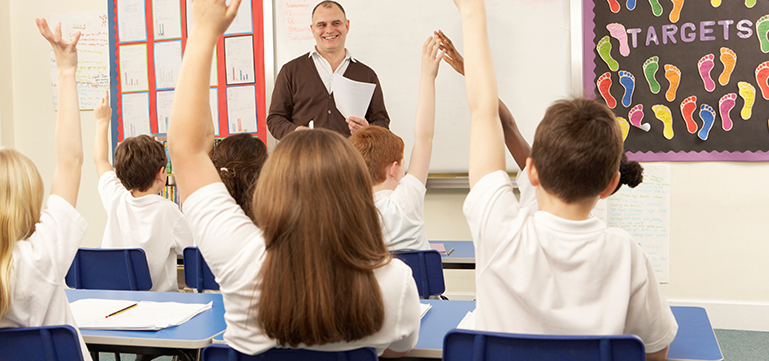Using games to improve pupils’ literacy skills

Quick links:
Information about the school
Parcyrhun C.P School is situated on the outskirts of the town of Ammanford in Carmarthenshire. The school has a Welsh language stream and an English stream, and both languages are used in the school’s day-to-day life. The school has a special unit for pupils with hearing impairments. There are currently 196 pupils on roll. They are divided into eight mixed-age classes.
Just over 25% of pupils are eligible for free school meals. Forty-two per cent (42%) of pupils have additional learning needs, including 12 pupils who are registered at the special unit. Six per cent (6%) of pupils come from Welsh-speaking homes, and 8% of pupils are from ethnic minority backgrounds.
The headteacher has been in post since January 2009.
Context and background to sector-leading practice
Leaders have high expectations for raising standards by ensuring that teachers provide education of the highest standard. The school’s aim is to develop an ethos of excellent teaching that will enable pupils to develop their literacy skills successfully. By implementing robust self-evaluation procedures, the need was identified to develop these skills by taking advantage of every opportunity to develop literacy across the curriculum. Providing excellent teaching is the foundation of the school’s mindset, and the school has succeeded in creating an open ethos of monitoring, evaluation and reflection in order to implement that vision.
A description of the nature of the strategy or activity
Effective procedures have been established, which include joint planning, evaluation and reflection on teaching practice among teachers. While planning to deliver the Literacy and Numeracy Framework, an emphasis was placed on developing purposeful resources by creating games and original resources to provide regular opportunities to develop pupils’ skills.
The aim while devising these games was to:
• raise pupils’ standards of literacy across the curriculum
• take advantage of every opportunity to raise standards of literacy
• ignite pupils’ curiosity and enjoyment when learning
• develop teachers to become excellent practitioners
The school succeeded in creating fun and stimulating games that skilfully interweave opportunities for pupils to practice their oral, reading and writing skills on a daily basis. The games develop according to the pupils’ age and ability, from the nursery class up to Year 6, where the resource is used to target higher order reading skills. These games are now a routine part of daily learning and have developed in terms of quality and form. Teachers in both streams work together and share resources, and they refine the games according to the requirements of the task, the specific skills to be developed, and the level of challenge.
In addition to monitoring by members of the senior management team, teachers have been given regular opportunities to monitor learning and each other’s work. Results of formal and informal monitoring have been discussed in staff meetings, and good practice, effective resources and original ideas are shared by all. A bank of differentiated games has been created over time, which develop pupils’ literacy skills effectively.
What effect has this work had on provision and learners’ standards?
By developing and using the various language games over a period of time, a positive effect can be seen on a number of aspects. The school considers that pupils have made excellent progress in terms of their outcomes, and all pupils have excellent literacy skills which, as a result, ensure full access to the curriculum.
The games succeed in engaging pupils’ interest and creating a positive attitude towards learning, and a happy and stimulating ethos on the classroom floor. Games are often delivered by support staff, who take advantage of every opportunity to extend pupils’ skills within a specific task. The school’s pupils are now completely familiar with the requirements of the literacy games and are able to play them independently. An additional effect is the extremely positive development that has been seen in pupils’ independent, co-operative and concentration skills.
How have you shared your good practice?
Ysgol Parcyrhun has been identified as a Professional Learning School, and has been invited to share excellent practice by writing a case study for the Professional Learning Schools network of the ERW regional consortium. In addition, the challenge adviser has identified excellent practice in the school in terms of teaching and learning. An exemplar video was created for the ERW website in order to share excellent learning and promote staff development across the region. Several schools across the region have visited the school to this end.
The school has already shared its vision in terms of raising standards of literacy and excellence in teaching by addressing staff at a training event for Foundation Phase co-ordinators in Carmarthenshire, which was organised by local authority officers. The school expects to continue to develop and share its good practice with other schools.